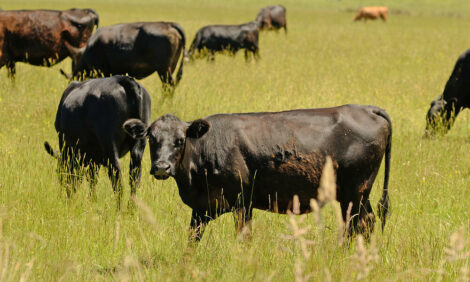



Beef Genetics Leads International Research
AUSTRALIA - Queensland International Fellowships awarded to a Rockhampton-based beef geneticist and a Brisbane plant virologist will lay the foundations for cutting edge international scientific collaboration.Fellowship 2010 recipients, Dr Brian Burns from Rockhampton and Dr Ralf Dietzgen from Brisbane, are both leading researchers with the Department of Employment, Economic Development and Innovation (DEEDI).
Dr Burns and Dr Dietzgen will use their awards to travel to the United States of America to undertake collaborative research with other leading scientists in Texas and Kentucky.
As a principal scientist, Dr Brian Burns leads ground-breaking research that provides cattle producers with advice on how to improve the productivity and profitability of northern Australia’s tropical beef cattle herds.
"Our aim is to optimise tropical beef cattle breeding programs using the most desirable genetic characteristics to grow Queensland’s $4 billion beef industry," Dr Burns said.
Dr Burns said he was keen to develop stronger and more formal long term relationships between US researchers at the Department of Animal Science, Texas A&M University; Meat and Animal Research Centre, USDA, Clay Centre, Nebraska; and those at the University of Queensland and the University of Adelaide.
"This collaborative partnership is all about scientists adopting a global perspective - not just for the life of the current five year project - but developed as a long term collaboration," Dr Burns said.
"From this Fellowship award, we now have the opportunity to initiate the two-way exchange of experience and know-how between scientists, industry and students.
"Through collaboration with Texas A&M, Queensland researchers will have access to extensive DNA data banks collected over the past 50 years from US resource herds that can be used to fast-track the screening of Australian cattle," Dr Burns said.
"A unified approach to identifying factors that influence the expression of favourable traits in tropical beef breeds, such as optimal reproduction and growth rates, carcase quality, environmental adaptation and behavioural traits will have significant benefits for the Queensland cattle industry."
Dr Burns said there was far ‘more’ to genetics than just knowing the sequence of building blocks in a DNA molecule.
"The ‘more’ is known as the study of ‘epigenetics’, that is, the study of factors that have the potential to influence the expression of a number of traits by turning certain genes on or off," he said.
Associate Professor Dietzgen will spend four months working with internationally recognised plant virologist Associate Professor Michael Goodin, the director of the Plant Science Biological Imaging Facility, Department of Plant Pathology at the University of Kentucky.
Dr Dietzgen is working on a novel project to make protein interactions visible in living plant cells using fluorescent labelling of the virus proteins and state of the art laser scanning microscopy.
"This research will give us a better understanding of what is going on at the molecular level between plants and the viruses that infect them," Dr Dietzgen said.
"We will be able to use such understanding to strengthen our work on crop improvement, environmental stress tolerance, biofuel feedstocks and studies of climate change.
"The findings from this research also have potential to enhance the understanding of diseases in horticultural and field crops, particularly those that are difficult to study, such as bananas and cereals.
"This area of research will provide new insights into how plants and viruses interact to cause disease and will ultimately contribute to securing global food supplies and therefore the future of agriculture in Queensland," Dr Dietzgen said.
TheCattleSite News Desk


